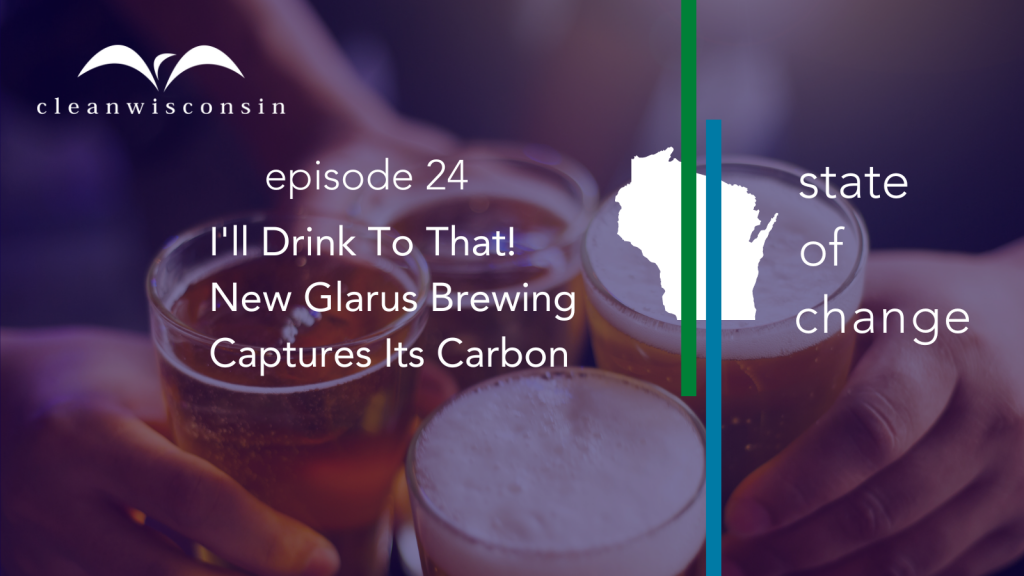On a hilltop in southern Wisconsin, a small brewery, long famous for its beer, is making headlines for a very different reason. Since last fall, New Glarus Brewing has been capturing more than 330 pounds of carbon dioxide (a bi-product of beer making) every hour of operation and reusing it. Join co-founder and master brewer Dan Carey for a tour.
Host:
Amy Barrilleaux
Guest:
Dan Carey, co-founder and master brewer, New Glarus Brewing
Background Reading:
Supporting Climate-Smart Agriculture
Wisconsin’s Roadmap to Net Zero by 2050
Where to Listen:
Full Transcript:
Amy Barrilleaux: How can you make a difference in the face of a problem as big as climate change? Maybe it’s about starting with what you can control and showing others what’s possible. In this episode, we travel to New Glarus Brewing, which has made a fundamental shift in its operations that has nothing to do with selling more beer. I’m Amy Barrilleaux, and this is State of Change from Clean Wisconsin.
On a hilltop in southern Wisconsin. A small brewery long famous for its beer is making headlines for a very different reason. Since last fall, New Glarus Brewing has been capturing more than 330 pounds of carbon dioxide every hour of operation and reusing it. I meet with co-founder and Master Brewer Dan Carey for a tour.
Dan Carey: So historically, the carbon dioxide that was in excess to naturally carbonating in the beer was vented to the outside because there was really no equipment to capture the CO2. So the problem is, small breweries are venting CO2 into the atmosphere and then buying CO2, which is kind of frustrating. And the reason why it was done that way is because the equipment to capture CO2, clean it, compress it to a liquid and then re-vaporize it to use it was too expensive and the technology wasn’t available. About ten years ago, I started to see that there were some companies, particularly one in Denmark, that were coming out with a new technology. So I was paying attention. And then about five years ago, the US government pulled out of the Paris Accord and I found that to be a bad decision. And oftentimes our government has asked companies to step forward, not rely on the government support. So I turned to my wife when we were watching the news and said, “You know, we should start to collect our own CO2, rather than venting it. We have to do what we can do for this issue.” So I started to look at machinery and equipment, and it took about five years for us to to find the machinery, to do the engineering, to purchase it, to have it built, to have it installed. And we’ve been running it since about September. So it’s a containerized system, and I’ll show it to you. Okay. Oh, so obviously you can hear the sound of the compressor that’s compressing the CO2 gas from a low pressure gas into a high pressure gas. From that point, we condense it into a liquid. That way we can store it. And you can see these towers here. These are the columns that we’re running water through against the flow of the gas to clean the gas so that we get rid of any off flavors of the CO2. It’s just pure CO2 gas because we don’t want any off flavors.
Amy Barrilleaux: This is actually kind of small for everything that it’s doing. It’s just all right here in this trailer.
Dan Carey: It’s all in this in this sea container. So it’s a very small and compact unit. It’s basically sized for our brewery as it is today. If we continue to grow, we’ll add a second one next to it as we grow into it.
Amy Barrilleau: And this captures all of the CO2 gas that comes from the brewing process?
Dan Carey: That’s correct. That’s correct.
Amy Barrilleaux: The system is just the latest way new Glarus is working to shrink its environmental footprint. Back in the office, we sit down to continue the conversation.
Tell me again about that moment when you saw that we had withdrawn from the Paris climate agreement. What kind of went through your mind at that time?
Dany Carey: Well, I guess I thought that… Let me think about that for a second. Sometimes I say things that I probably shouldn’t… I’m now a wealthy owner of a brewery, but my people are immigrants. So I understand how people that come across the border with nothing. I know how hard it is. I lived with not much money when I was a kid, when I was first married. We had no money, and it was a matter of do we buy antibiotics for our children or do we eat? So I understand that people are suffering, and I resent that there is a lack of empathy among the upper class. I resent that. There’s a feeling of, “What’s in it for me?” And certainly there are people that take advantage of our system. But there are a lot of people that need things. And to to to have a problem like climate change and avoid it and pretend that it’s not happening appeases a certain group of people because it makes people… If the sky is falling and you tell people that it’s not, then they give them a false sense of security for the short term. But if the house is on fire, you got to put the fire out. You have to call a spade a spade. And when I saw our government say climate change is not real, this is a bad investment for our country, I saw that as a short term thing to do because farmers are suffering. The I’ve been told that the suicide rate among farmers is equal to combat veterans coming back from wars. They are under a lot of stress and so climate change is directly impacting them and their ability to do business. It’s also impacting people that live along the coast, etc. And I, I just I just don’t see how it’s good leadership to ignore a problem that’s happening now. If you want to say that climate change is not human generated, that’s fine. The amount of CO2 is going up in the atmosphere. It has to be dealt with whether you want to blame people or the vagaries of universal change, that’s fine. It doesn’t matter. But the problem exists. Let’s deal with the problem. So to answer your question more directly. When our government said it’s not real, this is a bad deal for the United States, I believe that that’s false. And also, these same people are telling us that it’s not the government. What did Reagan say? That government is the is really the root of all of the problems and people need to take care of things. Okay, fine. Then I’ll do it. I will take care of it. I will do what I can. I’m producing CO2. I will stop producing CO2. And I guess I had a sense of outrage, sadness.
Amy Barrilleaux: And so your outrage and your sadness kind of led to problem solving — what do you do to to make a difference here in your business.
Dan Carey: A hundred percent. Everybody and anybody that has the opportunity should help move the ball forward in whatever way they can. So when we made this decision to do this, as I said, you know, it was a 15 year payback, but it was the right thing to do. And sometimes when you do the right things, karma takes care of you. So it turned out that the price of CO2 has gone up, the availability of CO2 has gone down. And a lot of my brothers and sisters in the brewing industry are having a hard time getting CO2. We’re making CO2. So it then gives us a competitive advantage. So if you believe that all of this is is snowflake, whatever, not interesting, not important, it makes good business sense. So if you’re if you’re strictly about dollars and cents, investing in this type of technology allows you to be to be more competitive going forward. So as I said, it’s karma.
Amy Barrilleaux: And it’s not just the CO2 reclamation. You have a lot of things going on at New Glarus Brewery that are aimed at reclaiming energy, being more efficient, doing whatever you can. What are some of the things that you’re most proud of here?
Dan Carey: As I showed you, our ability to to take all of the steam that we generate because the process of brewing generates a lot of steam. And as I said, steam contains a lot of energy. So by condensing that steam back to liquid, we’re able to recover that energy and reuse it. So we have a lot of clever people in our company, and I somewhat have the temperament of an engineer. So looking for opportunities is important to me. Are all of our employees know that this is a priority. And so they are looking all the time looking for opportunities. Every little bit of water, every drop of water that they can figure out ways to save, we all win. So once a year we get together and have a company meeting to talk about how that last year went. And part of that is to talk about key process indices or KPIs. We we track our labor. How much how many hours of labor it takes to make a barrel of beer, how much water, how much natural gas, how much electricity, how much sewer water is produced. We gauge those against world class breweries around the world and we graph them year to year. So then it becomes almost like a sports game. And that suits human temperament to say we, for example, were using 3.7 barrels of water to make a barrel of beer. Our goal for this year is to get that to 3.4. And people like that, because then we have a scoreboard and they can look and see positive or negative movement. And that is, as I said, that just suits our human competitive nature to say we want to do better than the big breweries.
Amy Barrilleaux: We were talking earlier about climate change and that kind of helpless feeling, maybe kind of like the feeling that you had when you saw that the United States government was washing its hands of doing anything about climate change. Have you been able to turn that helpless feeling into a feeling a little bit of empowerment, at least in terms of what you can control here at New Glarus?
Dan Carey: Well, yeah, I would say certainly I think I still have that feeling of sadness and helplessness and frustration. But rather than just wallowing in that, sometimes people have a tendency to to wear their indignation as a comfortable blanket, and then it makes you feel like you’re not part of the problem. And certainly we are all part of the problem. We’re all users. We all take more than we give, but we all have to do our best, you know, whether it’s recycling or walking or riding the bike or I mean, everybody has the opportunity to do what they can. So certainly if I can do my part, I do feel a sense of satisfaction, the satisfaction that at least I’m doing I’m trying to do the best that I can.
Amy Barrilleaux: You go all over the world looking for ingredients for new Glarus beer. Have you seen an impact in terms of the global warming temperatures all across the world?
Dan Carey: Yeah, it’s huge. In Europe, for example, it used to be that more or less, I don’t know, one out of five or so or even less crop years were bad and bad, meaning not enough rain or excessive heat. Historically European. barley and hops are bred to deal with moderate climates. Europe has has a mild climate, and of late, its summers are getting dry and hot, more so than they used to. So maybe one out of two or two out of three years are problematic. And now farmers, hop farmers, for example, are having to invest in things like irrigation, which previously they didn’t have to because they had plenty of rain. And Europe is very crowded, very dense, and so water is a priority and you can’t just sink a well and take water out of the aquifer because it belongs to the common good. So there’s a lot of regulations for them. So it’s very difficult. And in the United States, where we’ve also seen climate change, places like North Dakota, where a lot of barley historically has been grown, you just don’t know. Some years North Dakota is under water and some years it’s baking in the sun. So the instability causes very much difficulty for farmers. It appears to be affecting Europe more so than than us, at least in the short term. We’re doing research to find barley varieties and hops that will grow, that will produce the types of flavor that we get from our European raw materials. Most of our most of our raw materials come from the United States, but the small amount that comes from Europe, we’re trying to breed barley and hops that will grow closer to home so we’re not having to bring them from Europe. So diversification of my supply chain will help me as climate changes. And also the the war in Europe is–can you imagine that I’d be saying that war in Europe?– is affecting our supply chain. So to be able to buy hops in Wisconsin, for example, is important. So so we’re dealing with Wisconsin hop farmers and helping them to develop the technology. We pay them a premium for their raw materials because we know that a half acre farm is not going to be as competitive as a farm that’s 500 acres. So we encourage them. And buy as much, I think we’re probably the largest buyer of Wisconsin hops. And also the forest fires out in the west have affected hops in Yakima Valley. There’s been what’s called a smoke taint. There’s been so much smoke that it’s affecting the hops because it blocks the sun. And also this the smoke soot gets on the hops and then those hops are not usable. So it’s not good.
Amy Barrilleaux: What can the average, I guess, beer drinker do? Wisconsin is sort of — it’s beer and cheese here. What what can we do to, you know, be a part of the solution, I guess?
Dan Carey: Oh, boy. I think probably the biggest thing that people can do is vote. Pay attention. Well, one thing about capitalism that people don’t really understand is that is probably worth saying that the ultimate decision makers are the customers, the people that purchase, and we collectively can drive the market by our purchasing decisions. And that’s probably the biggest thing we can do. But we have to be really careful of greenwashing because sometimes — for example, we used to use corn in our beer and our customers said, Can you please use non-GMO corn? Yeah, sure. That’s a great idea. And the only place that I could really find, at that time, really find non-GMO corn was from China. Okay, so number one, I don’t want to buy from from China. And secondly, I don’t really believe that it’s non-GMO. So we opted to not use corn. My point is simply that you have to be careful what what’s real and what’s not real.
Amy Barrilleaux: Do you feel more hopeful than you did five years ago when you first saw that we had pulled out of the Paris Agreement?
Dan Carey: I am…Hmm… No. I want to believe. I want to believe that things will get better. I’ll tell you a story about that. I was at a hop growers convention out in California just recently. And some brewers go to this convention and hop brokers other people, but it’s mainly for farmers. And I was studying something at night and I’m kind of a nerd, so it’s not really worth explaining why. But I was reading a report, a world hop report from 1929 in the Czech Republic. It said, “This the worst harvest in living memory we had this year. And some farmers will have to go out of business.” And I laughed. And in my head I said, “Oh, it sounds like today.” And, you know, I thought maybe, maybe it’s always been that way. Maybe doom and gloom have just been the way that we’ve always been. And so then I met a farmer–I was eating breakfast and a farmer came and sat with me and he said, “I’ve been doing this for 40 years.” And he looked to me, you know, like a typical farmer, he looked to be kind of a conservative guy. And so we were talking and I told him that I read this. And so maybe it gave me a sense of optimism. And he said, “Oh, Dan, no, this is really bad. I’ve been doing this my whole life. This is really bad. We’ve got a problem.” And so I thought, “Oh shit, you know, it’s bad. It’s bad.”
Amy Barrilleaux: How do we come together, though? There’s so much divisiveness, divisiveness that to some extent was behind the withdrawal from the Paris Agreement. How do we manage to finally move things forward in such a critical time?
Dan Carey: The reality of the situation is, we have a dream of what America should be, and certainly we should all attempt to live up to that dream, because the dream is a great idea that everybody’s created equal. And we all know the life, liberty and the pursuit of happiness, it’s a wonderful dream. And whether we have been successful or not in the past is irrelevant. What matters is we need to move forward to be successful. And I wish that I wish that people would see that. That’s a wonderful dream. Let’s make it happen.






